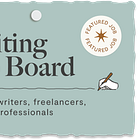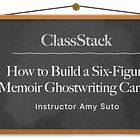✍️ How to Avoid Freelance Writing Scams Before They Waste Your Time (or Worse, Your Money)
How to stay safe and spot scammy clients.
Hey writers,
First — huge thank you to everyone who joined last Sunday’s How to Build a Six-Figure Memoir Ghostwriting Career class. It was such a blast sharing the real behind-the-scenes of my six-figure memoir ghostwriting career — plus all the hard-won lessons I learned on the way to making writing my actual job.
If you missed it live, good news: you can still watch the replay here:
Also, I’ve been loving hearing from writers about your wins — thanks for emailing me when you land cool work from the writing job board, and shoutout to Ben (featured in our writing wins section below!) for landing his first memoir ghostwriting job!
While freelancing is often very exciting (landing cool projects, hearing your client gush about the draft you turned in, seeing the numbers in your bank account grow) it’s not all sunshine and roses out here.
Part of growing a successful freelancing business is all about learning what missteps to avoid, and that’s what today’s newsletter covers.
In today’s newsletter, you’ll read about:
✨ How to protect yourself from scams in the freelance writing space
✍️ High-paying writing jobs you may have missed last week
📚 Writing wins from the community here at ✍️ Make Writing Your Job!
✍️ Missed This Past Week’s Writing Jobs?
Did you miss it? Here are the writing jobs on the most recent job board:
A well-known global tech brand is paying a senior copywriter $70–$105/hour to craft high-impact campaigns
A luxury jewelry brand is seeking a short story writer to craft narrative-driven copy for $80–$300/hour.
Six freelance editors are wanted for fiction, romance, horror, YA — plus a $5,400 health book gig.
✨ Plus, I have one featured job currently open:
If you missed the last issue of my writing job board, check it out at the link below:
🙌 Writing Community Wins!
Here’s what some of your fellow writers in the community have been up to lately:
Ben landed a great memoir ghostwriting job on the writing job board this week! Here’s what he shared with me: “I just started my first book ghostwriting gig, and I got it by applying on your job board! Thanks for doing what you do. Your job board is one of the best in the business, and your emails are all so relatable -- I've made writing my job since 2010 and it's a dream-come-true life with great money, complete flexibility, and frequent international travel. I have 15+ years of experience as a freelance content ghostwriter for executives, but this will be my first book. I've been trying to get my foot in the door as a book ghostwriter for a little while; this project will be a huge help to get my first book under my belt.” Congrats, Ben! 🎉
Shannon’s (Shannon’s Substack) new book is coming out soon! “My book, A Song for the Earth, is releasing on Monday! The project is a climate-focused, science-driven novel in verse for readers who want to learn more about the climate crisis from an ultimately hopeful point of view, and it will be available worldwide as of 30 June.” Get it here on Amazon!
Vanessa Novissimo Wright is getting her work published, also! “I’ve got two poems being published in a collection next month. I met the writer/creator on Substack a few months back. Celebrating 🎉” Grab the collection here.
Soul Moments shared that they “Started releasing my writing here on substack this week and found this inspiring writing circle ✨” Welcome!
❓ Want to see your community wins featured in an upcoming newsletter? Every week in my subscriber chat I ask for what amazing feats you’ve achieved that week, and I pick a handful to highlight.
Access the subscriber chat below:
🫖 Sunday Tea: How to Avoid Freelance Writing Scams Before They Waste Your Time (or Worse, Your Money)
Today’s newsletter is about something a little less fun — but absolutely essential if you want to actually make good money writing.
Because the internet is crawling with scams.
Some are hilariously obvious (the “Prince” who needs your bank details). Others are sneaky, sophisticated, and prey on exactly the fears, dreams, and hustle you’re trying to turn into a sustainable career.
I get it. I’ve almost fallen for a couple in my time — back when I was new, overworked, and desperate for the next big client. Luckily, most scams are pretty easy to spot once you know the red flags. But some scammers can pull one over on even experienced freelancers if you’re not paying close attention.
Today’s post will help you avoid the most common traps. So you can stay safe, get paid, and keep your creative energy focused on what matters: your writing.
Before we dive in, just a quick reminder: we do our best to hand-curate the Writing Job Board. In fact, I work with a team of newsletter editors and curators who turn over every stone on LinkedIn, Indeed, Threads, and all the corners of the internet to find high-quality opportunities for you each week.
For many of the Featured Jobs, I even hop on the phone with the client to make sure they’re legit.
But let’s be honest: no one can 100% guarantee that every client or every project will be a good fit. Some clients aren’t even clients: on rare occasion, they’re scammers looking to steal from you.
The truth is, even when clients look great on paper, you sometimes only see the red flags when you actually start working together.
We do our best to sniff out bad actors — and we rely on this community to help. If you ever have a bad experience with a client, please let us know. Email me directly, or share in the Subscriber Chat so you can help your fellow freelancers avoid the same headache.
(Shout-out to Chelsea, one of our awesome community members, who recently flagged a Featured Job that turned out to be shady. We pulled it down before forwarding any writers to the client. That’s exactly how this community keeps each other safe.)
Okay — now let’s talk about some of the most common freelance writing scams I want you to avoid like the plague.
Because once you know what to look for, you can spot 90% of these a mile away, save yourself the stress, and keep your focus exactly where it belongs: on building a real, well-paying writing career.
🕵️♀️ The Freelance Writing Scams to Watch For
Here are a few of the most common scams you’re likely to see floating around the freelance writing world.
Some are old-school classics with a fresh coat of internet paint. Others are surprisingly sophisticated. All of them can cost you time, money, and a chunk of your sanity.
Let’s break them down:
1️⃣ The “Overpayment by Check” Scam
This one has been around forever because it still works and isn’t instantly obvious.
Here’s how it usually goes:
The client offers to pay you by check (instead of a secure platform or invoicing tool).
The check accidentally arrives for too much money.
They ask you to refund the extra.
You might think you’re being professional by sending the surplus back — but their check bounces later. You’re on the hook for what you sent them, and they vanish into the ether.
Sometimes a check isn’t even part of this process, and they’ll overpay you via Paypal or another platform, but it’s more common for them to try and send you a bad check.
How to avoid it:
I strongly recommend not accepting checks unless you have an existing, trusted relationship with a client who absolutely insists.
Use invoicing tools like QuickBooks, PayPal, HoneyBook, etc. These let you set the exact amount due — no funny business or strange overpayments.
Never “refund” an overpayment unless it’s been cleared by your bank. Even then, be cautious, and do your due diligence. Again, just use a payment system where you can send invoices with no potential for an overpayment.
Honestly? I haven’t accepted a check in years. It’s just not worth the risk (and is also just a headache, especially if you travel as frequently as I do.)
2️⃣ The “We Just Need Your Banking Details” Scam
If a client is really eager to get access to your direct bank account, your routing numbers, I’d run.
Legit clients will pay you via normal, secure methods. Yes, that sometimes can mean ACH or a wire, but if someone is aggressive about wanting these things (especially if they haven’t signed a contract yet) then there might be some red flags.
How to avoid it:
Use invoicing and payment systems that don’t reveal your personal banking info.
Politely decline to share anything beyond what’s legally or financially required.
If wire transfer or ACH is the only way they’ll pay you, try using a platform like Wise that helps to hide your bank details when accepting wire and ACH payments.
3️⃣ The Contract Dodger
This one’s sneakier because it doesn’t always look like a scam.
Here’s the scenario:
The client refuses to sign a contract.
They say it’s “not necessary,” “too formal,” or “we don’t do that.”
If they won’t sign your contract (or at least offer theirs for you to review), that’s a giant waving red flag.
How to avoid it:
Don’t start work without a contract. Period.
Your contract protects both sides. A good client will appreciate that.
If they dodge, stall, or refuse? That’s your sign to move on.
4️⃣ The Phantom Client
This is less a classic scam and more a huge time-waster with some scammy vibes.
They want to “hop on a call” — but never do.
They ask for “just one sample” of your work for free.
They ghost once they have your writing.
Some of these people are just disorganized. Some are harvesting free content.
How to avoid it:
Have a clear policy on free samples. (Spoiler: mine is “no.”)
Charge for test projects.
Schedule a real call or Zoom before committing.
Even a quick 10-minute Zoom weeds out the fakes.
5️⃣ The Emotional Manipulator
This one is trickier.
Some clients don’t start as scammers, but they act like them when it’s time to pay.
They gush about your talent, promise ongoing work, maybe even friendship.
They become weirdly emotional about payment: “I’m going through a tough time right now…”
Suddenly your invoice is late and you feel bad for asking.
How to avoid it:
Be professional, even if they try to make it personal.
Stick to your payment terms.
Remember: you’re not a bank, therapist, or rescue charity.
A good contract will help protect you — and ensure flaky clients pay interest on late payments.
💡 Final Tip:
If a job or client feels off, pause. Ask questions. Talk it through with another freelancer.
I’d rather see you skip an opportunity than get burned.
We’re all in this together—so share your experiences, your wins, and your horror stories. Let’s keep this community the safest, smartest place on the internet for freelance writers.
👉 If you’ve got a client horror story or a scam warning to share, drop it in the comments of this post, or the paid Subscriber Chat to keep it confined to a more cozy space. You might just save someone else from learning the hard way.
🎓 See You in Class: What’s New on ClassStack
My live class series on everything you need to know to make writing your job.
💻 On the Blog: What’s New on AmySuto.com
Articles about the writing life.
Why I Quit Being a Digital Nomad. I traveled the world as a digital nomad for 5 years — and this year I decided to “settle down.” What that means and why I ended my travel-first lifestyle in this article.
How to Hire a Book Editor. Wondering when to hire a book editor? Learn the difference between developmental, line, and proofreading services — and how to choose the right editor for your novel, memoir, or nonfiction book.
Enjoyed today’s post? Please give it a “heart” ❤️ and share or restack it.
Sending creativity and good writing vibes your way,
-Amy













Do you have people pay half in advance for some projects? Or are you entirely paid after?
Thanks for the mention and for the helpful tips on scams. Much appreciated. 🦋